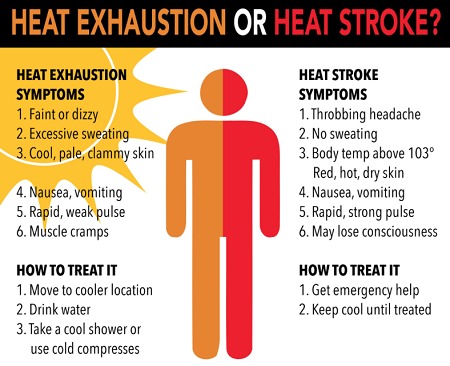
HEAT STROKE, HEAT EXHAUSTION & HEAT CRAMPS
Summer is almost here so it’s time to start thinking about the three kinds of heat related illness. Heat cramps, heat exhaustion and heat strokes are all possible during hot weather. All heat related injuries need prompt medical attention.
Heat cramps are muscle cramps. Usually these cramps occur in the arms or legs but may be in the abdominal or chest muscles as well. These cramps are caused by excessive body fluid loss through sweating. First aid includes moving the victim to a cool place, resting the cramping muscle and giving the person cool water.
Heat exhaustion signs include heavy sweating, weakness, fast pulse, normal body temperature, headache and dizziness, nausea and vomiting. First aid for heat exhaustion requires the worker to be moved to a cool place. Keep them lying down with their legs straight and elevated 8 to 12 inches. Apply cold packs, wet towels, or just wet their clothing to cool them. Give the victim cold water only if he or she is conscious. If the victim loses consciousness or if no improvement is noted within 30 minutes, seek professional medical attention.
Heat stroke is a true emergency! Signs and symptoms include high body temperature, unconsciousness, hot skin, rapid pulse and breathing, weakness, dizziness or headache. Immediate first aid is required. Move the victim to a cool place and immediately cool the worker by any available means (use ice and water from a jobsite cooler for example). Keep the head and shoulders slightly elevated. Monitor the airway, check to be sure the victim is breathing. Call for professional help or rush the heat stroke victim to a hospital immediately.
Monitor the airway, check to be sure the victim is breathing. Call for professional help or rush the heat stroke victim to a hospital immediately.
Prevention of heat illness is very important. Gradual adaptation to working in hot weather is a start. As the weather heats up, take a few short breaks during the day; and, if possible, schedule heavy work so that it does not have to be accomplished during the hottest part of the day. Dress sensibly and drink plenty of water. Keep a sharp eye out for potential heat injuries in co-workers. Try to practice prevention – it’s the name of the game – and it will keep you from becoming a victim of a heat related illness.
Heat stroke is a serious medical emergency.
Call for professional help immediately!


